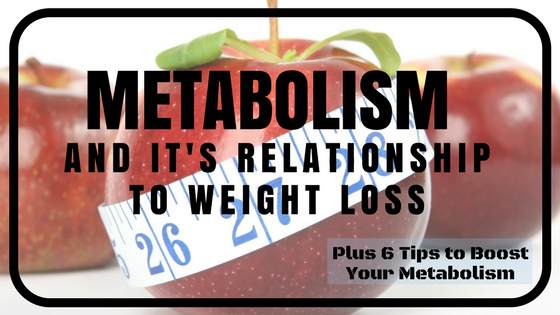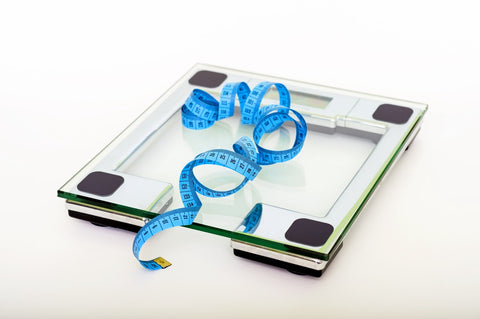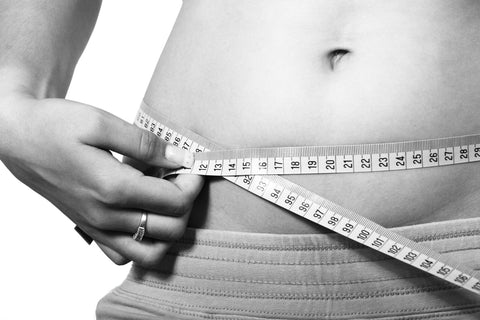
Surely you have heard the word metabolism. You may even know that there is some correlation between your metabolism and weight loss. Taking it one step further, you may even blame your slow metabolism on the fact that you aren't losing any weight, despite all the work you are putting in. So hearing the word metabolism in the same sentence as weight loss may be something that piques your interest. If there is weight loss involved, you are all in!
But first, it is important to understand what metabolism really is and how it relates to and affects your weight. We're going to cover those things and more. First, we will explain what metabolism is. Then we'll look at how it affects your weight in relation to losing weight. Then we will look at the important things to know and consider about your metabolism if you are trying to lose weight. Finally, we will give you six ways to boost your metabolism in an effort to lose weight.
What is metabolism? 
Though it is a complex biochemical process, put simply, metabolism is the process by which your body converts what you eat and drink into energy. Metabolism refers to the physical and chemical processes that occur in the body which keep us functioning normally in order to stay alive. These include anything such as breathing, blood circulation and nerve function.
During metabolism, two activities occur at the same time - the building up of body tissues and the storage of energy, or anabolism and catabolism. In a nutshell, metabolism is a balancing act of these processes. While there are certain things we can do to help try to maintain better balance of these too functions, metabolism isn't so simple. According to bodyandsoul.com, several factors determine your individual basal metabolism, including:
- Body size and composition: people who are larger or have more muscle burn more calories, even at rest.
- Gender: men tend to have less body fat and more muscle than do women of the same age and weight, which means they burn more calories.
- Age: as you get older, the amount of muscle tends to decrease and fat accounts for more of your weight, slowing down calorie burning.
- Growth: infants and children have a higher energy demand.
- Temperature: extremes of high or low temperatures require burning more fuel.
- Dieting: during excessive dieting our BMR slows to conserve energy.
- Drugs: certain drugs, such as caffeine, can increase BMR.

While it may be tempting to blame your metabolism for weight gain, because it is a natural process, your body has many mechanisms that regulate it to meet your body's individual needs. Unfortunately, weight gain is a complicated process. It's likely a combination of genetic makeup, hormonal controls, diet composition and the impact of environment on your lifestyle, including sleep, physical activity and stress. All of these factors result in an imbalance in the energy equation. You gain weight when you eat more calories than you burn — or burn fewer calories than you eat.
The truth of the matter is that, to some extent, your BMR is genetically determined but it can also be affected by certain health problems and by physical activity. While it is true that some people seem to be able to lose weight more quickly and more easily than others, everyone loses weight when they burn up more calories than they eat.
There are certain tactics you can implement that will manipulate the energy equation, essentially tricking the metabolism in an effort to lose weight. Making small lifestyle changes and incorporating these tips into your routine can help to rev up your metabolism. In return, boosting your metabolism can help you lose weight and keep it off, all while giving you more energy. Try to focus on these steps to boosting your metabolism and living an overall healthier life.
Six Tips to Boost your Metabolism
1. Figure out your Basal Metabolic Rate (BMR)

Go to this link to get the formulas for calculating your basal metabolic rate (and figure out how many calories you should eat daily for weight loss).Your basal metabolic rate is the amount of calories you burn in a 24-hour period naturally. After you know that number, you get an idea of how many calories your body needs on a daily basis. Then you can work on creating a calorie deficit by changing your exercise and eating habits. Remember, eating less than your basal metabolic rate in an effort to lose weight is never a good idea.
Resist the urge to cut calories by too many or your body will go into starvation mode. Your metabolism will then begin to slow in order to conserve energy. This will have a negative impact on your weight loss goals, especially if you already have a slow metabolism.
2. Exercise to Manage Stress and Increase Metabolism
To help manage your stress and improve your metabolism in a healthy way, consider adding exercise to your daily routine. Find some different ways to be active each day. Consider kicking off your day with a brisk walk or taking a walk on your lunch break. The more active you become starting small, the easier it will be to introduce more regular aerobic or strength exercises into your routing later on. Consider yoga and tai chi because they not only offer meditation elements to help with stress but also build muscle to improve the number of calories you burn at rest.
3. Build up Your Muscles

One of the variables that affect your resting metabolic rate is the amount of lean muscle you have. At any given weight, the more muscle on your body, and the less fat, the higher your metabolic rate. That's because muscle uses a lot more energy than fat while at rest so the logic is if you can build up your muscle, and reduce your body fat, you'll have a higher resting metabolism and more quickly burn the fuel in your body.
4. High-intensity interval training (HIIT)
HIIT workouts involve quick and very intense bursts of activity. They can help you burn more fat (than any other type of workout) by increasing your metabolic rate, even after your workout has finished.
5. Get Enough Sleep
Lack of sleep has negative effects on metabolism and, therefore, is linked to a major increase in the risk of obesity. It's also been shown to boost the hunger hormone ghrelin, and decrease the fullness hormone leptin. This could explain why many people who are sleep deprived feel hungry and struggle to lose weight. Make sure to try and get at least 7-8 hours of sleep/night.
6. What to Include in Your Diet
When it comes to eating so-called "metabolism-boosting" foods in normal amounts, they won’t affect your metabolism enough to cause weight loss all on their own. That being said, when combined with moves like eating frequent, small meals throughout the day, strength training, staying hydrated, and sleeping well, reaching for these foods and drinks definitely can’t hurt.
- Eat More Protein: Because muscle burns more calories than fat, these foods will help you maintain more muscle mass and less body fat. Most healthy protein sources also provide low-calorie and low-fat meal choices, which lead to increased weight loss over time. It increases your metabolic rate by 15–30%, compared to 5–10% for carbs and 0–3% for fats. Additional benefits include the fact that eating protein has also been shown to help you feel more full and prevent you from overeating.
- Drink Cold Water: Choosing water over other liquids means consuming less calories while also temporarily speeding up your metabolism. Drinking 17 oz of water increases resting metabolism by 10–30% for about an hour. Choosing cold water is significant because as your body uses energy to heat it up to body temperature the calorie-burning effect may be even greater. Added bonus: Studies show that drinking water a half an hour before you eat can help you eat less by helping to fill you up.
- Consume More Natural Foods: Natural and organic foods are easier for your body to break down and convert into energy. If you have a slow metabolism, you want to avoid eating highly processed foods that are difficult to digest and, therefore, more likely to be converted into fat.

- Drink Green or Oolong Tea: Both contain the active ingredient, catechin, which is proven to crank up metabolism. Researchers conducted a series of studies in dieters and found that those who drank tea lost more weight than those who didn't, suggesting that catechins may improve fat oxidation and thermogenesis, your body's production of energy, or heat, from digestion. If you drink five eight-ounce cups of green tea a day, you can increase your energy expenditure by 90 calories a day. Try it over ice or hot.
- Add Spices to Your Diet: Adding ingredients like cayenne pepper, mustard, jalapeno peppers, ginger and cinnamon can help to speed up your metabolism even after you are finished eating. Spices can also be used to make bland foods taste better so that you are more likely to eat healthy foods and achieve weight loss.
Leave a comment
Comments will be approved before showing up.
Also in Pogamat Blog

Buy Yoga Mats That Last: The Durability and Design of Pogamat

At Home Workouts Comprehensive Guide Staying Fit in Your Living Room


